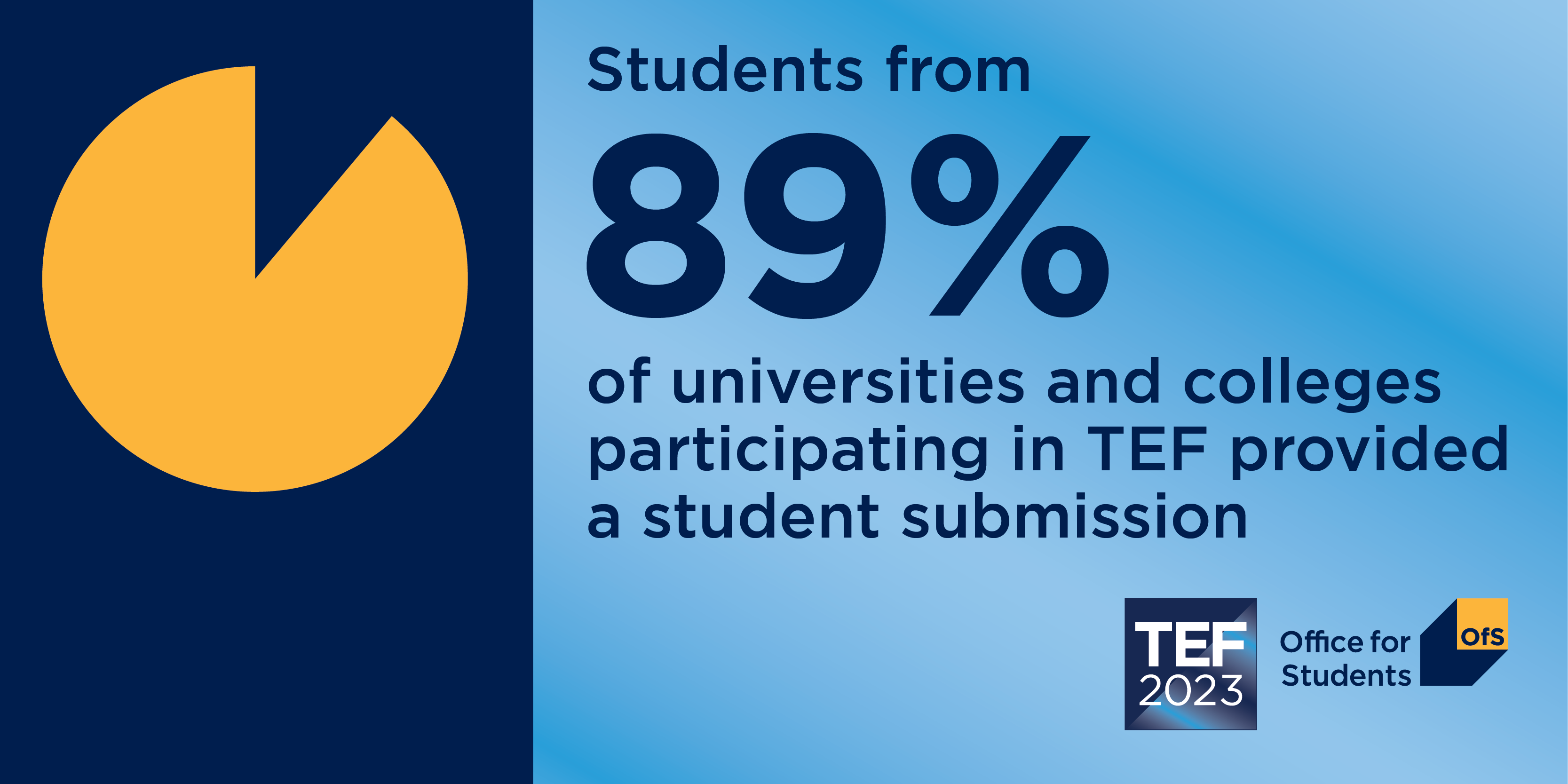Over 200 student submissions have been received for the 2023 Teaching Excellence Framework (TEF). TEF manager, Ranjeet Dhinsa, and University of Portsmouth Education Officer and TEF student contact, Jade Underwood, reflect on the value of student engagement.

In the first year since we introduced the TEF student submission, we have received 204 student submissions from 228 participating universities and colleges. This represents an impressive 89 per cent participation rate for what is an optional process for students.
What is the TEF?
The TEF is a national scheme run by the OfS. Its objective is to encourage universities and colleges to deliver excellent teaching, learning and student outcomes for all their students. A panel of experts, including student members, assess and rate universities and colleges for excellence above the OfS’s minimum requirements on the quality of their courses and student outcomes.
Based on these assessments, universities and colleges can receive one of three ratings: ‘Gold’, ‘Silver’, or ‘Bronze’. Where there is an absence of excellence above the minimum requirements, the outcome will be ‘Requires improvement’.
What is the TEF student submission and why is it important?
Through the TEF panel, students have always been closely involved in the process, but this is the first year we have introduced an independent student submission. The submission gives existing students a formal way to share their academic experience and influence improvement in learning, teaching and student outcomes. For each university or college taking part, a nominated TEF student contact can make a single student submission on behalf of the student body.
The submission gives insight on what it's like to be a student at that university or college and what they gain from their experience, in a way that is more direct than evidence in the provider submission, independent from the provider submission and more current than the TEF indicators, which are based on retrospective data. Although student submissions are optional, we encouraged students to make them and provided guidance and support during the process.
Prospective students will be able to use TEF ratings, which will provide a clear signal of excellence as useful context alongside other information when deciding what and where to study. The new TEF process means that students can feel confident that ratings have been informed by the student perspective throughout, adding credibility and robustness to the final award.
Next steps for student collaboration with the TEF
To support our evaluation of TEF 2023 we will be contacting TEF student contacts to gain their view on the guidance they received from the OfS during the development of their student submission. We will also be keen to hear about any lessons learned and the impact the exercise has had on the student voice at universities and colleges. We are sincerely thankful to TEF student contacts for their commitment and enthusiasm and look forward to gaining their valued feedback.
We have received varied and creative submissions from students, including presentations, videos and audio files. These, along with the TEF provider submissions, are currently being assessed by the TEF panel. Once this process is complete, we expect to publish the student and provider submissions along with the TEF ratings in autumn 2023.
The TEF student submission:
A student perspective
University of Portsmouth Education Officer and TEF student contact, Jade Underwood, shares her experience of developing the student submission for her university, and what that means for universities and colleges more widely.
The new TEF process and the addition of the student submission has created greater synergy between the work of a students' union (SU) and their university. For example, TEF fosters better collaboration between SUs and universities to not only work together to ensure a good student experience - where SUs have traditionally been most focused - but also to achieve positive outcomes for all students.
The TEF 'Features of Excellence' have also provided joint focus points, highlighting aspects of the educational experience that SUs can engage their universities on. This has enabled universities and SUs to identify areas where they need more information to understand the student experience, where to improve student feedback mechanisms and where to best focus resource.
This first year of student submissions was a challenging and rewarding task. The SU structures vary significantly across the higher education sector, but I believe having well-resourced and supported SUs and student representation is key in delivering a robust student submission. I am pleased the OfS will be evaluating the experiences of TEF student contacts and I look forward to the outcomes of this important work.
It’s thrilling to see the opportunities the TEF has brought to students and will bring to future students. It's redefined what makes an excellent student experience - it's empowered the student voice and connected SUs and their universities.

Comments
Report this comment
Are you sure you wish to report this comment?